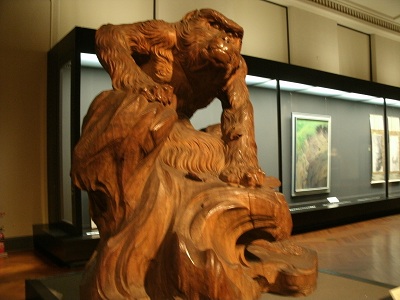Takamura Koun

- Born: 1852/2/18
- Died: 1934/10/10
- Other Names: 中島光蔵 (Nakajima Mitsuzou)
- Japanese: 高村光雲 (Takamura Kou'un)
Takamura Kôun was a prominent sculptor of the Meiji and Taishô periods, and father of sculptor & poet Takamura Kôtarô. He has been described as the "father of modern Japanese wood sculpture."
Kôun was born in the Shitaya neighborhood of Edo; his name was originally Nakajima Mitsuzô. He began studying under Takamura Tôun - the last great Buddhist sculptor of the Edo period style - in 1863, and was officially adopted by Tôun's older sister, taking the Takamura name. He continued sculpting in wood through the Meiji Restoration, and began working for the Tokyo Bijutsu Gakkô (Tokyo School of Fine Arts) when it opened in 1889. Kôun became an instructor at the school the following year. He was later named one of the Imperial Household Artists (teishitsu gigeiin), and was given honorary court rank of Upper Fourth Rank.[2]
Though initially trained in more traditional modes of wood sculpture, he began, particularly in the 1890s-1900s, to incorporate Western approaches and aesthetics of realism into his wooden sculptures. He also ventured into sculpting in bronze. While there had been a tradition of bronze sculpture in Japan going back over 1000 years, producing sculptures in the Western style and mode was rather cutting-edge in Japan at the time. Over the course of the next several decades, Kôun's works were shown at numerous international and domestic expositions, where he frequently earned high awards. From 1907 onwards, he regularly served as a judge in the official government-sponsored exhibitions.
Kôun's most famous works include "Aged Monkey," a wooden sculpture held at the Tokyo National Museum; a standing statue of Saigô Takamori in Ueno Park; and a mounted statue of Kusunoki Masashige in the outer gardens of the Tokyo Imperial Palace.
His many students included his son Takamura Kôtarô, Yamazaki Chôun, Yonahara Unkai, and Hirakushi Denchû.
References
- "Takamura Kôun." Asahi Nihon rekishi jinbutsu jiten 朝日日本歴史人物事典. Asahi Shimbun-sha.